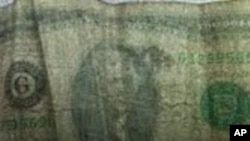With Zimbabwean small businesses and consumers continuing to face chronic shortages of small-denomination US and South African bills and coins, commercial banks say that it would be prohibitively expensive for them to step in to relieve the public.
But Finance Minister Tendai Biti told VOA that discussions with the US Treasury about procuring small bills and coins have significantly progressed.
Change shortages have plagued retailers, street vendors, commuter "combi" bus drivers and ordinary Zimbabweans since early 2009 when Zimbabwe abandoned its own dollar and adopted a monetary regime of mixed hard currencies. The two main currencies in circulation are the US dollar and the South African rand.
Bankers said that while they can purchase South African rand coins from the public, it is not easy for them to source small U.S. bank notes.
Commercial bankers are also struggling to meet minimum capitalization requirements, so they are not eager to expend precious capital in purchasing bills and coins.
Banker Samson Nhliziyo said that buying small denomination U.S. and South African bills in the interbank market is too expensive.
Independent Harare economist John Robertson said banks have not even tried to import small bills and coins. “They are finding it difficult to source these currencies from the open market due to high costs,” he said.
Retailers have refused to take up the supply of one-rand coins offered by the Reserve Bank of Zimbabwe, saying the exchange rate offered was not in their favor.
Finance Minister Biti told VOA Studio 7 reporter Blessing Zulu that the US Treasury has laid out various options for Zimbabwe to address its small change problem: purchasing bills and coins from the Federal Reserve, or from US banking institutions.
Despite Biti's optimism as to an eventual solution, the nation’s consumers and small businesses could face the problem of change for some time.
Some local remedies have emerged - for instance the spreading use of the Zambian kwacha in the northern resort town of Kariba for change and cross-border trading.
When it launched last year independent daily newspaper Newsday, selling for 50 US cents, issued tokens good for another issue that vendors could give customers.
But many retailers and street vendors hand back chocolates - or toothbrushes.
For more on the problem, reporter Patience Rusere turned to Bulawayo businessman Alex Goosen and Business Forum Secretary Roy Magosvogwe. Goosen said the lack of sufficient small change is a constant irritant and tends to drive inflation.





